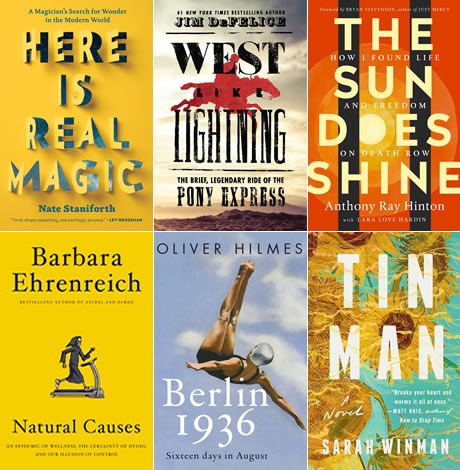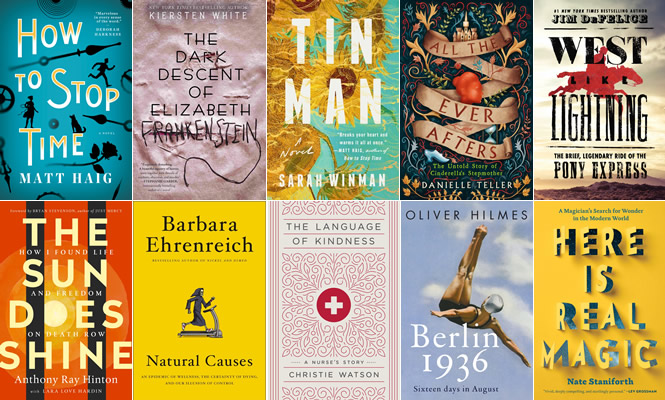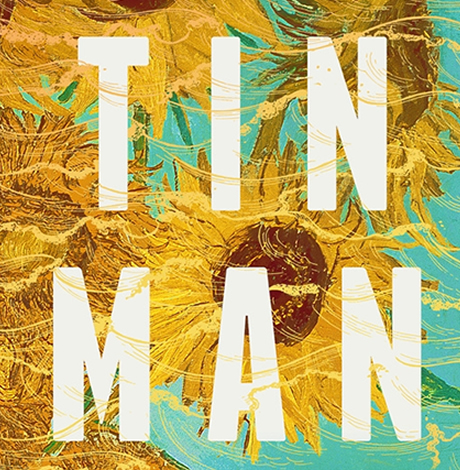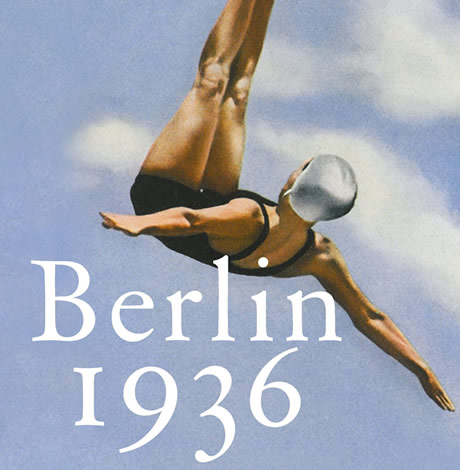Books
YEAR IN REVIEW 2018 BOOKS: Best page turners of the year
‘Berlin 1936,’ time-bending ‘Tin Man’ among year’s strongest fiction


‘Berlin 1936,’ time-bending ‘Tin Man’ among year’s strongest fiction
The year’s best books often came in unexpected places. Here are some highlights.
Fiction
Just about every person alive grew up feeling sorry for poor little Cinderella. In “All the Ever Afters” by Danielle Teller, we see the classic story from the POV of Agnes, the evil-not-evil stepmother. This novel is an eye-opener: there are always two sides to a story and both could be correct.
Another two-sides-to-the-tale tale is “The Dark Descent of Elizabeth Frankenstein” by Kiersten White, a novel of the woman who loved Victor Frankenstein. Or did she? Without him, she’d be homeless, broke and hungry. With him, she would always fear his temper and the horrible things she was discovering about him. It’s a dark-and-stormy kind of book, perfect for anyone who wants winter chills of a different sort.
A lot of mini-stories make up “Berlin 1936” by Oliver Hilmes, translated from the German by Jefferson Chase. It’s a multi-level tale of Nazis, gypsies, homosexuals and secrets in the infancy of the Third Reich, told in a conglomerate, slice-of-life sort of way that will make you forget that it’s all fiction.
Every year, it seems, scientists claim that humans will achieve immortality within a few decades. That’s a curse in “How to Stop Time” by Matt Haig.
In 1598, a man named Tom fell in love with a woman named Rose. They had a daughter and then Rose fell ill and died; Tom, however, survived because he’s an “alba.” Tom is more than 400 years old and there are two things he wants: to feel as normal as he did in 1598, and to find his daughter, who is also an alba. Romancy? Yes, but also part sci-fi, part history, a little drama, and a whole lot of wonderful.
To round out the fiction list, there’s “Tin Man: A Novel” by Sarah Winman. It’s also the story of Ellis, who lost his wife and his best friend, the former to a car accident and the latter to AIDS. Ellis misses Annie because she opened his world; he misses Michael because Michael pushed him to do things he would have never tried. But there were so many things Ellis never knew about Michael, until he finds Michael’s journal. Emotional, dramatic, also romantic, here’s a book that’ll make you curl up in your chair, stricken, for an hour after you’ve finished it.
Nonfiction
For anyone who’s ever wondered how that guy on TV does those illusion tricks, “Here is Real Magic” by Nate Staniforth is a book for you. Staniforth always wanted to be a magician but he wanted to do it big. Little coin tricks were old-school so, in this book, he goes on a journey to find out of magic is real or not. Hint: this isn’t a magic book. Read it and you’ll be left with answers you weren’t even asking for.
You may never see “The Language of Kindness” by Christie Watson on any other best of list and that’s too bad. Watson is a nurse, and this is a book about being ill, care-giving, living and dying. Beware that some of the stories are a bit gruesome, but this is a lovely book for anyone alive.
And not that there’s a theme here or anything, but you’ll also want to read “Natural Causes” by Barbara Ehrenreich, a book about the things we do to avoid dying. It’s informative, funny, wry and intelligent. Hint: rant, rail, avoid sweets, eat kale, do all you want, but you’re going to die someday anyhow.
There’s a ton of surprising gratitude inside “The Sun Does Shine: How I Found Life and Freedom on Death Row” by Anthony Ray Hardin with Lara Love Hardin. The reason is that Anthony Hardin was put on death row for a crime he didn’t commit. First surprise: it took 30 years for him to be exonerated. Second surprise: this book holds a whole lot less anger than you’d think it would, and a whole lot of uplifting. Of all the books on this list, it’s the one you’ll never regret reading.
And finally, rounding up the nonfiction list, there’s “West Like Lightning: The Brief, Legendary Ride of the Pony Express” by Jim DeFelice. History fans will love this book because DeFelice focuses on the Pony Express but doesn’t ignore other major players in the Civil War era. Readers who like tales of little-known life will love this book, too, as will anyone who loves a good oater. Bonus: it’s one of those easy to browse books that will pull you in tight.
Books
How one gay Catholic helped change the world
‘A Prince of a Boy,’ falls short of author’s previous work

Brian McNaught, the pioneering gay activist and author of 1986’s “On Being Gay” and 1993’s “Gay Issues in the Workplace,” has written a personal account about his Catholic faith and homosexuality. It is a memoir without much substance.
“A Prince of a Boy: How One Gay Catholic Helped Change the World” (Cascade Books) is a strong personal statement by McNaught. He helped change family relationships. He helped change attitudes about homosexuality. He helped change workplaces, but the world?

In January 2023, the Catholic News Service reported that Pope Francis announced that, “being homosexual is not a crime.” In December 2023, NPR reported that Pope Francis approved “Catholic blessings for same-sex couples, but not for marriage.” Francis died Monday at age 88. Although Catholics may not see homosexuality as a crime, they see sex outside of marriage as a sin. They see same-sex marriage as a sin.
In 2021, Gallup reported that membership in the Catholic Church had declined 20 percent since 2000. In 2025, the Pew Research Center’s Religious Landscape Study found that nearly 40 percent of Americans identified as Protestant, while the same study found that only 19 percent identified as Catholic.
McNaught devotes much of his book to his life as a gay Catholic. It is challenging to read about his personal struggle. Some readers may find it interesting. Others might find it boring. Catholic readers may find it more compelling than Protestant readers.
As the above statistics prove, McNaught has much more work to do to change the Catholic Church’s views about homosexuality. We should be glad for his contribution to the debate within the Catholic Church. We should pray for full acceptance of gays in the Catholic Church.
“A Prince of a Boy” becomes more interesting when McNaught describes his work as an educator on LGBTQ issues. He has had an impact on workplace policies, academic programs, and public education, and his lectures, books, and other materials are widely used.
Based on my experience in the federal government and volunteering with LGBTQ organizations from the Bay Area to Washington, D.C., I believe McNaught’s work as an educator has improved LGBTQ lives, careers, and families. During the Clinton administration, I gave many copies of “Gay Issues in the Workplace” to personnel directors. I felt their staff could benefit from reading it. I thought it would help the lives and careers of my federal LGBTQ colleagues.
McNaught’s “A Prince of a Boy” was released in December 2024. Anti-gay crusader Anita Bryant died the same month. Bryant campaigned against a gay rights law in Florida. She began a national campaign against gays.
When Bryant successfully reversed a gay rights ordinance in Dade County, Florida, McNaught wrote the important essay “Dear Anita, Late Night Thoughts of an Irish Catholic Homosexual.” The essay is not in “A Prince of a Boy”; however, McNaught mentions Bryant.
In his training programs, McNaught describes homosexuals as journeying from confusion to denial to acceptance to pride. “Anita Bryant and AIDS brought Gay people to identity pride very quickly,” McNaught writes. San Francisco Supervisor Harvey Milk (1930-1978) and other activists reached similar conclusions about Bryant’s vicious anti-gay campaign.
McNaught helped change the LGBTQ world and brought pride to many people’s lives. McNaught walks in pride, works in pride, and educates others in pride.
“A Prince of a Boy” is a disappointing book. It provides small details about Brian McNaught’s large, proud life. A meaningful biography about this great gay leader is long overdue.
The Blade may receive commissions from qualifying purchases made via this post.
Books
‘Pronoun Trouble’ reminds us that punctuation matters
‘They’ has been a shape-shifter for more than 700 years

‘Pronoun Trouble’
By John McWhorter
c.2025, Avery
$28/240 pages
Punctuation matters.
It’s tempting to skip a period at the end of a sentence Tempting to overuse exclamation points!!! very tempting to MeSs with capital letters. Dont use apostrophes. Ask a question and ignore the proper punctuation commas or question marks because seriously who cares. So guess what? Someone does, punctuation really matters, and as you’ll see in “Pronoun Trouble” by John McWhorter, so do other parts of our language.

Conversation is an odd thing. It’s spontaneous, it ebbs and flows, and it’s often inferred. Take, for instance, if you talk about him. Chances are, everyone in the conversation knows who him is. Or he. That guy there.
That’s the handy part about pronouns. Says McWhorter, pronouns “function as shorthand” for whomever we’re discussing or referring to. They’re “part of our hardwiring,” they’re found in all languages, and they’ve been around for centuries.
And, yes, pronouns are fluid.
For example, there’s the first-person pronoun, I as in me and there we go again. The singular I solely affects what comes afterward. You say “he-she IS,” and “they-you ARE” but I am. From “Black English,” I has also morphed into the perfectly acceptable Ima, shorthand for “I am going to.” Mind blown.
If you love Shakespeare, you may’ve noticed that he uses both thou and you in his plays. The former was once left to commoners and lower classes, while the latter was for people of high status or less formal situations. From you, we get y’all, yeet, ya, you-uns, and yinz. We also get “you guys,” which may have nothing to do with guys.
We and us are warmer in tone because of the inclusion implied. She is often casually used to imply cars, boats, and – warmly or not – gay men, in certain settings. It “lacks personhood,” and to use it in reference to a human is “barbarity.”
And yes, though it can sometimes be confusing to modern speakers, the singular word “they” has been a “shape-shifter” for more than 700 years.
Your high school English teacher would be proud of you, if you pick up “Pronoun Trouble.” Sadly, though, you might need her again to make sense of big parts of this book: What you’ll find here is a delightful romp through language, but it’s also very erudite.
Author John McWhorter invites readers along to conjugate verbs, and doing so will take you back to ancient literature, on a fascinating journey that’s perfect for word nerds and anyone who loves language. You’ll likely find a bit of controversy here or there on various entries, but you’ll also find humor and pop culture, an explanation for why zie never took off, and assurance that the whole flap over strictly-gendered pronouns is nothing but overblown protestation. Readers who have opinions will like that.
Still, if you just want the pronoun you want, a little between-the-lines looking is necessary here, so beware. “Pronoun Trouble” is perfect for linguists, writers, and those who love to play with words but for most readers, it’s a different kind of book, period.
The Blade may receive commissions from qualifying purchases made via this post.
‘The Cost of Fear’
By Meg Stone
c.2025, Beacon Press
$26.95/232 pages
The footsteps fell behind you, keeping pace.
They were loud as an airplane, a few decibels below the beat of your heart. Yes, someone was following you, and you shouldn’t have let it happen. You’re no dummy. You’re no wimp. Read the new book, “The Cost of Fear” by Meg Stone, and you’re no statistic. Ask around.

Query young women, older women, grandmothers, and teenagers. Ask gay men, lesbians, and trans individuals, and chances are that every one of them has a story of being scared of another person in a public place. Scared – or worse.
Says author Meg Stone, nearly half of the women in a recent survey reported having “experienced… unwanted sexual contact” of some sort. Almost a quarter of the men surveyed said the same. Nearly 30 percent of men in another survey admitted to having “perpetrated some form of sexual assault.”
We focus on these statistics, says Stone, but we advise ineffectual safety measures.
“Victim blame is rampant,” she says, and women and LGBTQ individuals are taught avoidance methods that may not work. If someone’s in the “early stages of their careers,” perpetrators may still hold all the cards through threats and career blackmail. Stone cites cases in which someone who was assaulted reported the crime, but police dropped the ball. Old tropes still exist and repeating or relying on them may be downright dangerous.
As a result of such ineffectiveness, fear keeps frightened individuals from normal activities, leaving the house, shopping, going out with friends for an evening.
So how can you stay safe?
Says Stone, learn how to fight back by using your whole body, not just your hands. Be willing to record what’s happening. Don’t abandon your activism, she says; in fact, join a group that helps give people tools to protect themselves. Learn the right way to stand up for someone who’s uncomfortable or endangered. Remember that you can’t be blamed for another person’s bad behavior, and it shouldn’t mean you can’t react.
If you pick up “The Cost of Fear,” hoping to learn ways to protect yourself, there are two things to keep in mind.
First, though most of this book is written for women, it doesn’t take much of a leap to see how its advice could translate to any other world. Author Stone, in fact, includes people of all ages, genders, and all races in her case studies and lessons, and she clearly explains a bit of what she teaches in her classes. That width is helpful, and welcome.
Secondly, she asks readers to do something potentially controversial: she requests changes in sentencing laws for certain former and rehabilitated abusers, particularly for offenders who were teens when sentenced. Stone lays out her reasoning and begs for understanding; still, some readers may be resistant and some may be triggered.
Keep that in mind, and “The Cost of Fear” is a great book for a young adult or anyone who needs to increase alertness, adopt careful practices, and stay safe. Take steps to have it soon.
The Blade may receive commissions from qualifying purchases made via this post.
-

 Federal Government3 days ago
Federal Government3 days agoHHS to retire 988 crisis lifeline for LGBTQ youth
-

 Opinions3 days ago
Opinions3 days agoDavid Hogg’s arrogant, self-indulgent stunt
-

 District of Columbia2 days ago
District of Columbia2 days agoD.C. police seek help in identifying suspect in anti-gay threats case
-

 Virginia3 days ago
Virginia3 days agoGay talk show host wins GOP nom for Va. lieutenant guv









